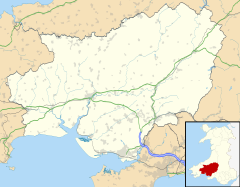| Cwmamman | |
|---|---|
| Community | |
Location within Carmarthenshire | |
| Principal area | |
| Country | Wales |
| Sovereign state | United Kingdom |
| Police | Dyfed-Powys |
| Fire | Mid and West Wales |
| Ambulance | Welsh |
Cwmamman is a community in Carmarthenshire, about 12 miles north of Swansea in southwest Wales. Literally meaning "Amman valley", it takes its name from the River Amman which runs through the area.
Cwmamman was the original name of the valley. As coal-mining boomed during the late 19th century two adjoining villages grew up in the valley, known as Glanamman to the west and Garnant to the east. The distinction was promoted by having two stations on the Llanelly Railway built in 1840, Garnant (originally called Amman Valley) and Glanamman. Until 1912 the area straddled the parishes of Betws to the south of the river and Llandeilo north of the river. In 1912 an urban district was established covering Glanamman and Garnant, under the name Cwmamman.[1] The Cwmamman area now has much smaller population than in its heyday at the turn of the 20th century. The actual population for the community at the 2011 census was 4,486.[2]
Christchurch, the only Commissioners' church in southwest Wales was built in Garnant in 1839–42.[3] In contrast, four Methodist chapels were constructed in Glanamman before St Margaret's church was built in 1933.
Cwmamman is 78.47% Welsh speaking and lies at the foot of the Black Mountain. The community is bordered by the communities of: Betws; Llandybie; Dyffryn Cennen; and Quarter Bach, all being in Carmarthenshire; and by Gwaun-Cae-Gurwen and Pontardawe in Neath Port Talbot.
Cwmamman Urban District was abolished in 1974, with the area becoming instead a community.[4] District-level functions passed to Dinefwr Borough Council, which was in turn replaced by Carmarthenshire County Council in 1996.[5][6]
The two Carmarthenshire County Council electoral wards covering the community are called Garnant and Glanamman, each electing one county councillor.[7]
- ^ Annual Report of the Local Government Board. 1912. p. 237. Retrieved 18 January 2024.
- ^ "Community population 2011". Retrieved 14 April 2015.
- ^ Lloyd, Thomas; Orbach, Julian; Scourfield, Robert (2006). Carmarthenshire And Ceredigion, Pevsner Architectural Guides Volume 6 of The Buildings of Wales. Yale University Press. p. 198. ISBN 9780300101799.
- ^ Local Government Act 1972
- ^ Local Government Act 1972
- ^ Local Government (Wales) Act 1994
- ^ "The County of Carmarthenshire (Electoral Arrangements) Order 2021". Legislation.gov.uk. 22 September 2021. Retrieved 24 July 2022.

